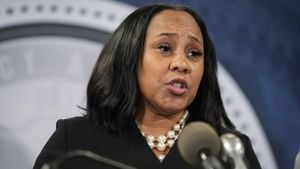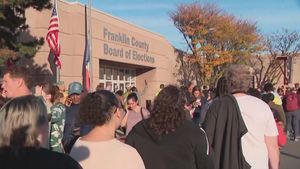The Marvel Cinematic Universe has been awash with excitement, particularly following the finale of Agatha All Along, which has left fans buzzing and speculating about what lies ahead for the beloved characters. The show, which focuses on the enigmatic Agatha Harkness, played by Kathryn Hahn, has captivated audiences not only with its storyline but also with its potential for future narratives.
Since its debut, Agatha All Along has garnered significant attention, leading up to the season finale consisting of episodes eight and nine. The culmination of the series provided fans with numerous Easter eggs and connections within the broader Marvel Cinematic Universe (MCU). Many fans anticipated the return of popular characters, particularly Wanda Maximoff, known as Scarlet Witch. Despite the speculation, her appearance was absent from the finale, prompting questions about why this decision was made.
Showrunner Jac Schaeffer recently shed light on the reasoning behind this creative choice. She explained to The Hollywood Reporter why incorporating Scarlet Witch would have undermined Agatha's character arc. "It wasn’t really a for-real conversation... creatively, it didn’t feel fair to the character of Agatha. This is her story, and the idea of bringing Wanda back felt like it would upend her story in a way," Schaeffer stated, emphasizing the importance of Agatha's narrative. She acknowledged the impact of Wanda's actions on Agatha's storyline but reinforced her commitment to developing Agatha’s character independently.
This finale didn’t just close the door on Wanda—it also opened paths for new explorations within the MCU. The plot thickened as audiences got hints about Agatha's future, especially with her son being positioned to have significant emotional ties to Wanda. The connection was subtle, yet Schaeffer is eager to see how this storyline develops as the MCU progresses.
Fans were eager to dissect the finale, sharing their thoughts and analyzing the layers of meaning packed within the episodes. Viewers noted various Easter eggs, leading to discussions about upcoming shows and their potential crossovers within the MCU framework, particularly with projects like Vision and the anticipated connection back to WandaVision.
Another layer to the Agatha All Along narrative is Disney’s decision to enter the series for various awards categories, including the Golden Globes and SAG Awards, hinting at the series' reception and impact. While Agatha All Along operates under the guidelines for limited series—requiring stories to tell complete narratives without recurring main characters—speculations arose from Variety’s suggestion of the possibility of more seasons. Given the show's success and the strong viewership it has amassed, maybe Disney is reconsidering its strategy.
Since the initial reveal of the series, fans were immersed in Agatha's world, filled with spells and mischief. The finale kept audiences on their toes with twists and potent storytelling. The series creator shared what it was like constructing this unique narrative, utilizing the magical “Witches' Road,” which became central to Agatha’s arc. The Witches' Road is portrayed as both alluring and treacherous, almost serving as Agatha’s rite of passage. This adds depth to her character, allowing viewers to see her growth.
A list of noteworthy characters graced the series, including newcomers like Joe Locke and Aubrey Plaza, establishing layers of intrigue and complexity to the existing narrative. The tension within the relationships and the constant shifts kept audiences engaged, intrigued to see how the dynamics would evolve.
Reflecting on the season, viewers recognized the multiple intersections between Agatha's tale and broader MCU themes. Loyal fans found themselves dissecting each episode, passionately discussing possible tie-ins with other Marvel projects and analyzing subtle hints. Social media buzzed with commentary, theories, and applause for stylistic choices made throughout the season.
Meanwhile, speculation continues to swirl around possible future roles for characters like Aubrey Plaza’s character—what could this mean for Agatha All Along and the MCU at large? Could this be the beginning of more extensive exploration of the witchcraft lore within upcoming MCU films and series? Where could Schaeffer lead the audience next, and how will Agatha’s development shape new heroes or conflicts?
While the finale wrapped up several plot points, many queries remain—a conscious decision by the creators to keep fans on their toes and fuel the anticipation for future arcs. Schaeffer's comments about upcoming storylines were cryptic yet inspiring, encouraging viewers to remain vigilant as the MCU expands. The series not only provided entertainment but sparked conversation, speculation, and emotional investment from audiences everywhere.
Overall, the finale acts as both conclusion and prelude, leaving viewers to wonder about the fate of their favorite characters and the directions yet unexplored within Marvel's ever-expanding universe. For now, we wait with bated breath to see how Agatha Harkness’s story will continue to weave through the Marvel narrative, satisfying fans eager for more—ever since the series first introduced us to its tangled web of intrigue.



